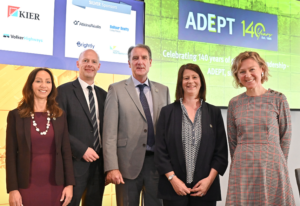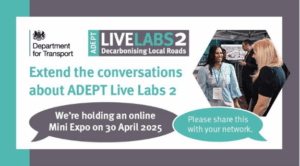The latest white paper from ADEPT’s (Association of Directors of Environment, Economy, Places and Transport) £22.9m SMART Places Live Labs Programme has been published today.
For a Department for Transport funded programme focused on transformational innovation in local highways, Adult Social Care, takes Live Labs in a completely new direction. Two separate trials have led two different local authorities to consider an unanticipated wider application for using sensors in local communities.
The programme’s fifth white paper described how Buckinghamshire Council and Suffolk County Council are considering the potential of SMART technology to support adult social care.
The Buckinghamshire Live Lab has focused on creating a Living Lab in the Fairford Leys area of Aylesbury Garden Town. As part of this, the local authority has created a MESH network around the town with interconnected sensors and nodes built into street lighting. The adult social care trial, due to take place in January 2022, will see sensors installed in the homes of 12 volunteers – who will also have wearable devices – all connected to an app.
The app will be able to send alerts to the wearer – for icy weather, for example – but also to carers, alerting them to incidents such as falls, someone leaving home unexpectedly or appearing to be lost. The trial will also test how the technology might enable people to stay in their homes for longer with greater autonomy and independence, and thereby reducing pressure on the social care system.
Suffolk is also using sensors, exploring how a long range wide-area network (LoRaWAN) and geofencing (virtual perimeter) technology might enable a similar level of independence. The technology can monitor daily routines to check people are active and behaving normally, but also check for household problems such as water leaks or unsafe carbon monoxide levels.
At this stage, the technology is being tested only with volunteers. There is a long way to go before trials with vulnerable people could take place, with their informed consent. The white paper describes how securing trust and confidence in data collection and its use by local authorities presents a huge challenge. Extensive collaborative engagement would need to take place with potential users, families, carers, community and stakeholder groups before any sort of pilot programme could get off the ground.
Adult Social Care is part of a series of white papers from the Live Labs programme. They aim to make learnings and insights available to industry as they happen, giving decision-makers the opportunity to capitalise on the work being done through the programme.
The two-year, £22.9million DfT-funded Live Labs programme grew out of a need to accelerate innovation across the local roads sector. This has rapidly developed to encompass use of data, SMART materials and energy, resulting in innovative pilots ranging from using drones and vehicle sensors to identify potholes to creating ‘travel personas’ to support behavioural change.
Neil Gibson, Chair of the Live Labs Commissioning Board, said: “The potential for using SMART technology to enable people to be safe and stay independent in their own homes for longer is fantastic, but it is still in its infancy. Both trials are being set up purely to test the technology with volunteers drawn from local authority teams. So much depends on people being able to trust the technology and how their data will be analysed, used and shared. To get to that point will require a lot of engagement and investment, both in time and resources, as there is no question that local authorities and their partners would need to get this right for their communities. That said, the potential benefits are incredible, and we are excited to see the outcomes of the trials.”
Giles Perkins, Live Labs Programme Director said: “From the beginning, Live Labs’ overarching ambition has been to innovate through collaboration. These trials bring together digital technology and infrastructure with highways and social care teams with the potential to provide support for vulnerable people as part of a 24/7 care package. The white paper demonstrates how far we have come in knowledge sharing and creating social value for our communities.”
Luciano Lopes, Buckinghamshire Live Labs Project Manager said: “This initiative could allow the local authority to promote independence and wellbeing using digital services and technology. It also means that care delivery could be better coordinated, interventions could take place at an earlier stage, and citizens need tell their story only once rather than multiple times.”
Brigitte Sodano-Carter Suffolk Live Labs Project Manager said: “The opportunity to support the vulnerable in our communities was both thought provoking and exciting. We used colleagues as volunteers as the pandemic limited our options. Being a volunteer gave me a unique insight how it felt to use the technology. It opened my mind to how we must invest, not only in educating the public, but winning their trust around how and why we would use personal data. Using technology to support our vulnerable to remain independent and safe is essential but would also reduce the pressure on our partners in the police and health services.”
ADEPT represents local authority, county, unitary and metropolitan Directors. The Live Labs initiative is part of ADEPT’s SMART Places programme to support the use of digital technology in place-based services.
The eight Live Labs are being led by Buckinghamshire Council, Central Bedfordshire Council, Cumbria County Council, Reading Borough Council, Suffolk County Council, alongside joint projects by Solihull Council and Birmingham City Council (West Midlands), and Kent and Staffordshire County Councils. The programme is supported by project partners SNC-Lavalin’s Atkins business, EY, Kier, O2, Ringway and WSP.
Read the report here.
(Picture – Adept)
























